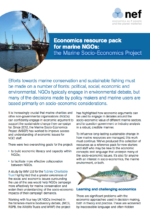Economics Resource Pack for Marine NGOs
The Marine Socio-Economics Project
24 June 2016
Efforts towards marine conservation and sustainable fishing must be made on a number of fronts: political, social, economic and environmental. NGOs typically engage in environmental debate, but many of the decisions made by policy makers and marine users are based primarily on socio-economic considerations.
It is increasingly crucial that marine charities and other non-governmental organisations (NGOs) can confidently engage in economic argument to support the sustainable change they campaign for. Since 2012, the Marine Socio Economics Project (MSEP) has worked to improve access and understanding for NGO staff to economic issues.
There were two overarching goals for the project:
- to build economic literacy and capacity within NGOs;
- to facilitate more effective collaboration between NGOs.
A study by IMM Ltd for the Tubney Charitable Trust highlighted that a greater awareness of the social and economic issues surrounding the use of the sea would help NGOs campaign more effectively for marine conservation and widen their understanding of the socio-economic impacts of their campaign demands.
Working with four key UK NGOs involved in the fisheries-marine biodiversity debate, (MCS, RSPB, the Wildlife Trusts and WWF) the project has highlighted how economic arguments can be used to engage in debates around the socioeconomic value of different marine sectors, and to question government or industry analysis in a robust, credible manner.
To influence long-lasting sustainable change in how marine resources are managed, this work must continue. We’ve produced this collection of resources as a reference pack for new starters and staff who may be new to the economic concepts and language that underpin many of the socio-economic issues. It’s also for anyone with an interest in socio-economics, the marine environment, or both.
We produced the following resources as part of the MSEP project.
1.‘Economics in policy making’ briefings
These briefings deal with key economic concepts, their application to public policy and identify the major flaws in some of the associated mainstream economic thinking. The briefings include marine-related case studies to show the real life application of these economic approaches.
Briefing 1: An overview of economics
Briefing 2: How economics is used in government decision-making
Briefing 3: Valuing the environment in economic terms
Briefing 4: Social cost-benefit analysis and social return on investment
Briefing 5: Discounting and time preferences
Briefing 6: Multi-criteria analysis
Briefing 7: Beyond GDP: Valuing what matters and measuring natural capital
Briefing 8: Markets, market failure and regulation
Briefing 9a: Finance and money: the basics
Briefing 9b: What’s wrong with our financial system?
Briefing 10: Property rights and ownership models
Briefing 11: Behavioural economics – dispelling the myths
2. Facts and figures briefings
These briefings are snapshots of the key statistics, trends and information from across the marine environment. They put the economic concepts from the first set of briefings into a marine context, and encourage project participants to replicate this approach in the future. To ensure the statistics remain up to date, we have included links to the main data sources used to conduct the research and analysis and can be accessed using the links below.
Capture fisheries
UK marine infrastructure
Marine energy
Marine recreation
Flows and aquaculture
3. Wider data sources
The resource pack also includes a summary of the key sources of relevant information for economic analysis; including trade and tax data which can be downloaded here.
4. Marine Socio-Economics Project workshops
The MSEP project ran a number of workshops between 2012 and 2015, listed below. The presentations and write-ups from these workshops are available on the project website and via the links provided below.
Impact Assessment of the Marine Strategy Framework Directive (MSFD) and Marine Conservation Zones (MCZs)
Infographic Impact Assessment for Marine Conservation Zones
Theory of Change
Valuation
Re-aligning nature & progress
EMFF (European Maritime and Fisheries Fund)
Topics Environment Fisheries & farming







